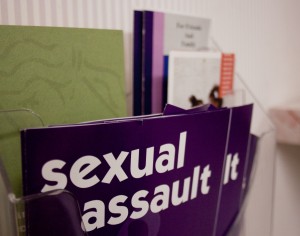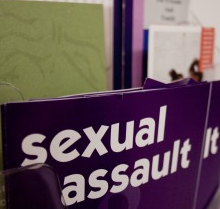As the rape trial of former University of Montana quarterback, Jordan Johnson, takes the national stage, St. Thomas students and administration are refocusing on sexual assault education to prevent sexual violence on campus.
A prosecutor’s affidavit said 20-year-old Johnson, and the alleged victim decided to watch a movie at her house Feb. 4, 2012, where the rape allegedly occurred.
An investigation by the Department of Justice is ongoing into a complaint alleging the University of Montana discriminated against female students, faculty and staff by failing to address a sexually hostile environment caused by its failure to appropriately respond to reports of sexual assault.

Rachel Harris, director of St. Thomas’ strategic student initiatives, said the St. Thomas community does a lot to make sure students are well-informed about sexual assault and rape.
“Unfortunately, sexual assault has been a concern on college campuses for at least 25 years,” Harris said. “This is always a topic that is near and dear to our hearts to educate.”
In 2011, this new way of looking at sexual assault education was put to the test when the “Don’t Be That Guy” campaign was introduced in Vancouver. The campaign’s advertisements focused on the sexual assault perpetrator rather than the victim. The campaign showed some success, as the number of sexual assault incidents decreased by 10 percent in Vancouver after the ads were introduced.
Senior Candace Svoma said she understands the call for a new way of looking at sexual assault education.
“Probably 99 percent of the time women are the victims,” Svoma said. “So it kind of seems counterproductive to only present the information to women and not men.”
Sophomore Meghan Talbot said she isn’t sure that the idea of teaching men not to sexually assault women would work.
“For someone to be capable of sexual assault or rape, I don’t think you could change their moral standpoint just by educating them about the issue,” Talbot said.
Harris said St. Thomas tries to educate men and women equally about sexual assault.
“I think that the institution’s commitment to educating men is just as strong as its commitment to educating women. We really believe that, especially on a college campus where so many of the situations are between people who know each other, there’s an equal responsibility for communication and consent,” Harris said.
Freshman John-Paul Dees said he understands how sexual assault education would be beneficial from a male standpoint.
“Males share an equal responsibility in preventing sexual assault, whether it’s men who know what sexual assault is and then are capable of stepping in when they see something occurring, or just someone being learned in the subject and being able to prevent their own actions,” Dees said.
Harris said communication and consent are key for both genders when preventing sexual assault.
“They need to communicate clearly their limitations and boundaries,” Harris said. “You can’t effectively educate a college community, or any community, without educating both men and women.”
Having thorough and meaningful programs, while also having enough of the programs to get students to participate, is also a challenge, Harris said.
St. Thomas hosts Mike Domitrz for his ‘Can I Kiss You?’ lecture in the fall, a lecture aimed toward underclassmen that focuses on consent and mutual respect in relationships. The university also partners with other Associated Colleges of the Twin Cities schools to host programs and events throughout the year that are focused on educating and preventing sexual assault.
Harris said freshman year is when a lot of the sexual assault information programs are pushed, and after that, students are less likely to attend.
“I think that outside of the Domitrz’s lecture, which is targeted toward freshmen,” Harris said. “Most of the other programs that we do are fairly elective, so there’s always a challenge of engaging students in the topic.”
Sophomore Tim Bouchard said he had already received sexual assault information, despite finishing only his first week at St. Thomas as a transfer student.
“I actually just had a meeting about policies and procedures in which they did go over sexual assault,” Bouchard said.
Harris said no matter how information is given, St. Thomas’ main concern is for the students.
“Nobody wants students to experience this during their four years on the campus,” Harris said. “We all have that kind of commitment in our hearts of we need to continue to educate students about it.”
Gabrielle Martinson can be reached at mart5649@stthomas.edu.



